 AT SULMONA CATHEDRAL:
AT SULMONA CATHEDRAL:
Meeting with youth and
visit to the crypt
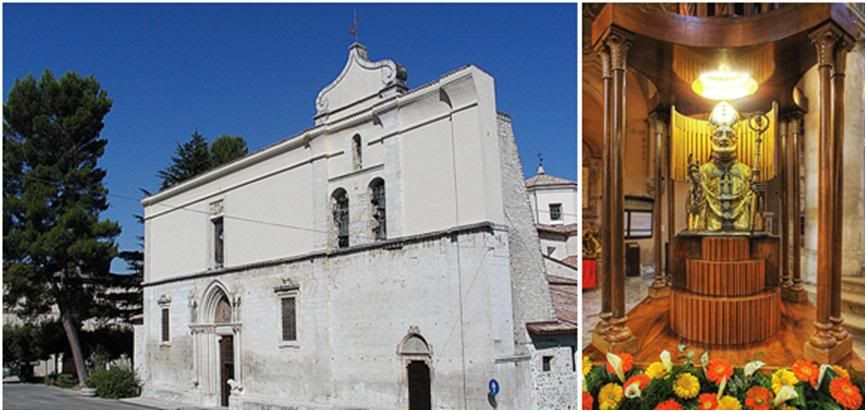 The Cathedral of San Panfilo was built in 1075 and completed in 111; it was rebuilt after a devastating earthquake in 1706. San Panfilo was an 8th-century bishop of the region who is buried in the crypt of the Cathedral (chapel and tomb, right photo).
The Cathedral of San Panfilo was built in 1075 and completed in 111; it was rebuilt after a devastating earthquake in 1706. San Panfilo was an 8th-century bishop of the region who is buried in the crypt of the Cathedral (chapel and tomb, right photo).
The last event of the day in Sulmona for the Holy Father was a visit to the Cathedral of San Panfilo, for a meeting with the youth of the diocese and a visit to the cathedral crypt.
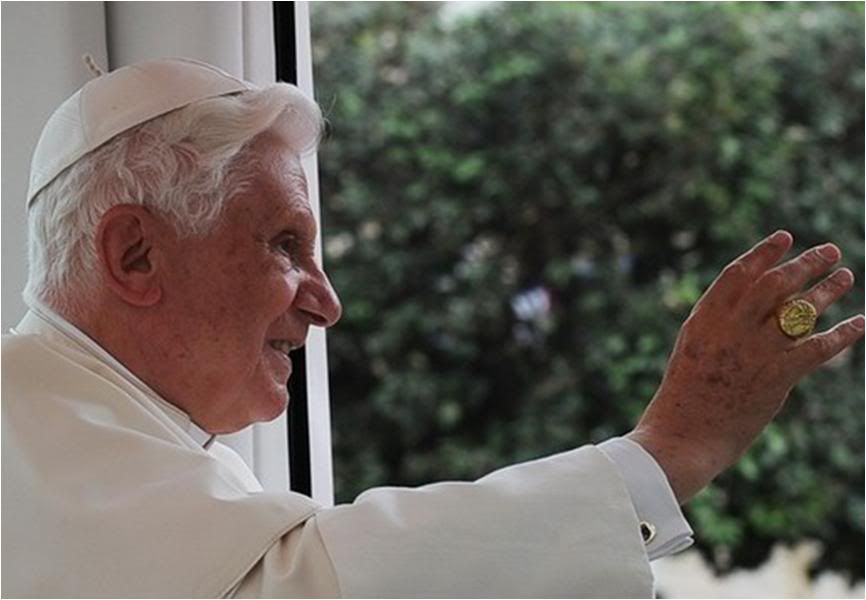
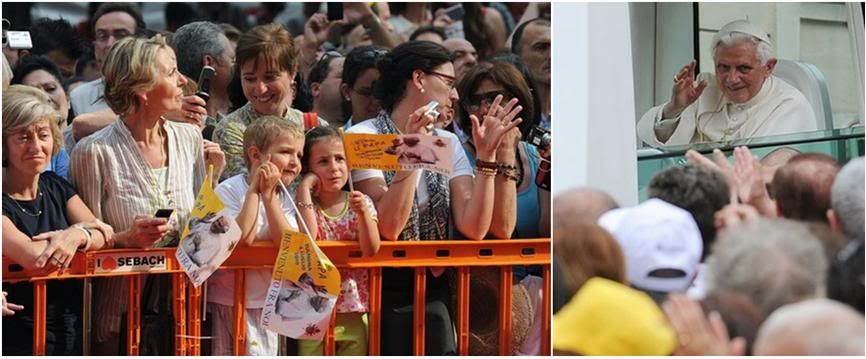
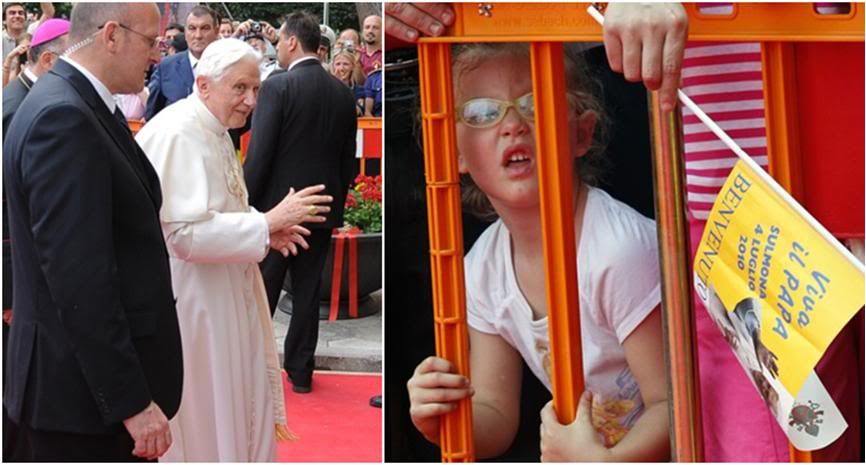
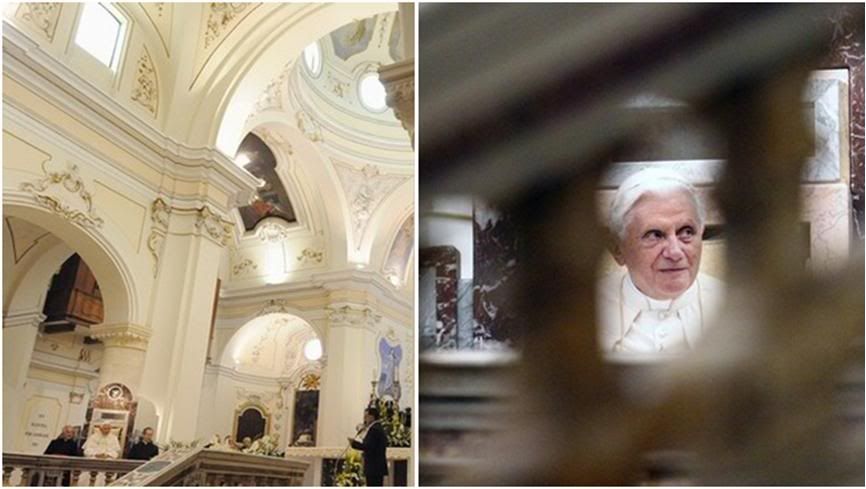
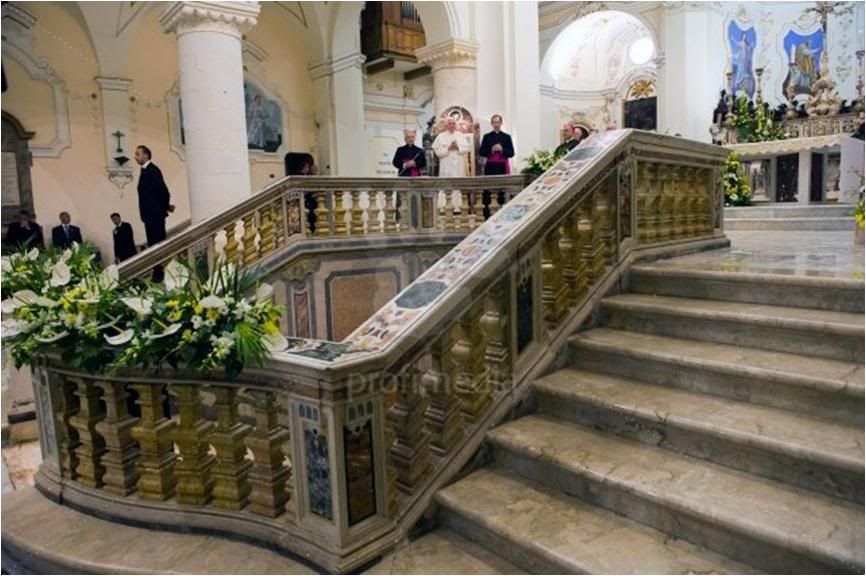
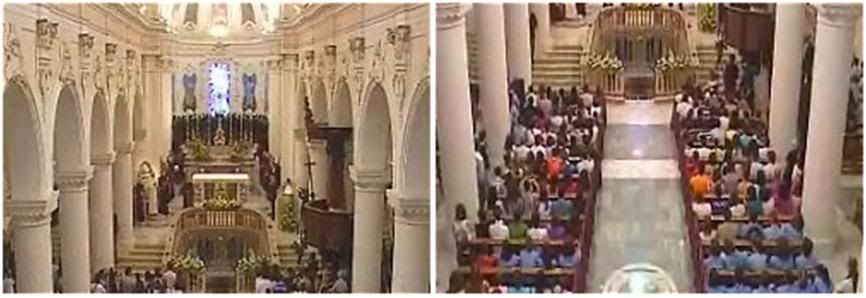

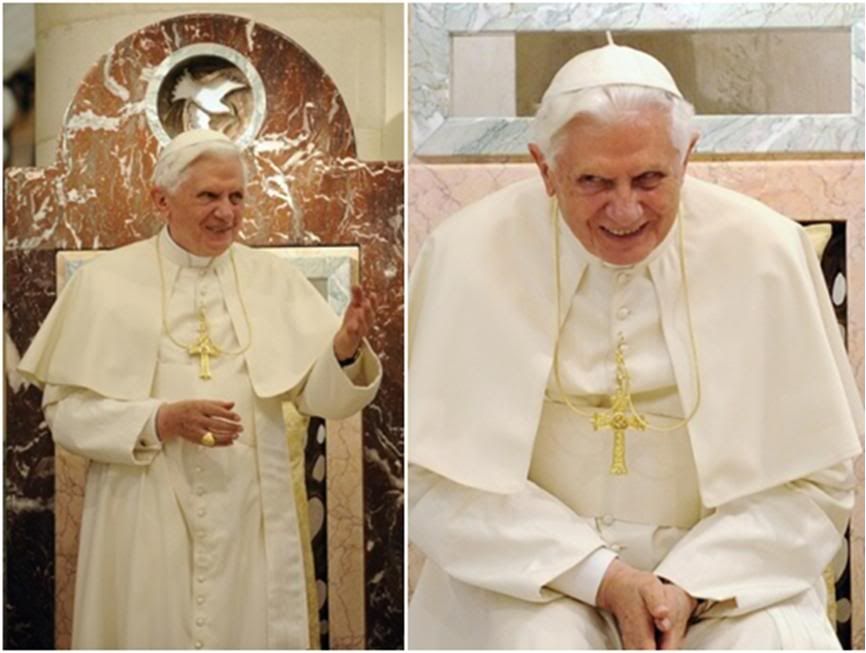

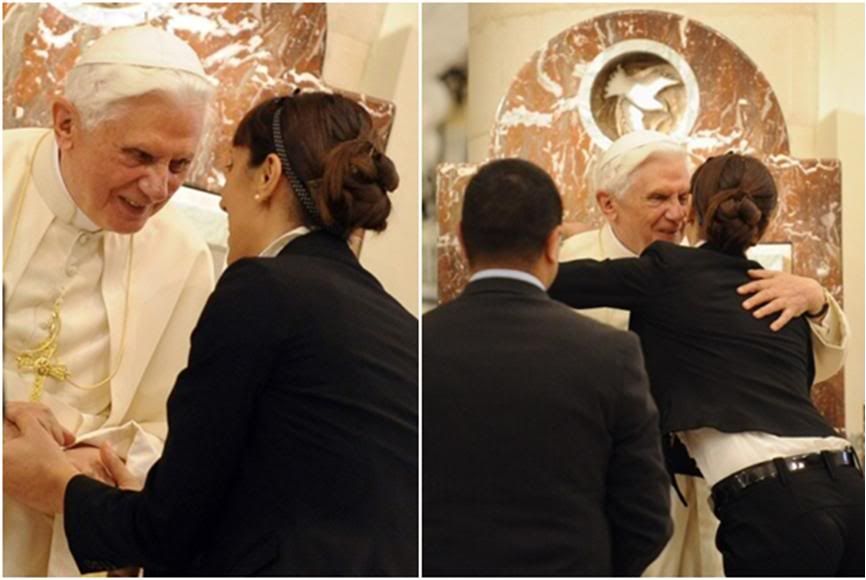 Above, the Pope thanks youth rep Francesca Orsatti and her colleague Cristian di Sansa, after their greeting.
Above, the Pope thanks youth rep Francesca Orsatti and her colleague Cristian di Sansa, after their greeting.
Here is a translation of the Holy Father's address to the diocesan youth of Sulmona-Valva:
Dear young people.
First of all, let me say how very happy I am to be with you. I thank God for the chance he has given me to stay some time with you, as a father of the family, and with your bishops and priests. But I also thank you for the words you addressed to me through your 'spokesmen' Francesca and Christian.
You have asked me some questions with a great deal of frankness, and at the same time, you have demonstrated that you have firm points of conviction. This is very important - that you are young men and women who reflect, who ask questions and have a sense of truth and goodness.
That means, you know to use both heart and mind, and this is no small matter! Indeed, I would say it is the main thing in this world to learn to use well the intelligence and the wisdom that the Lord has given us.
The people of your land in the past did not have many means to study, nor even to assert themselves in society, but they had what makes a man and a woman truly rich: faith and moral values. These are what build persons and civil coexistence.
Two fundamental aspects emerge from your words: one positive, the other negative. The positive aspect is your Christian view of life - an education that you have obviously received from your parents, your grandparents, and your other educators - priests, teachers, catechists.
The negative aspect lies in the shadows that obscure your horizon - they are concrete problems which make it difficult to look at the future serenely and with optimism. But there are also false values and illusory models that are offered to you, promising to fill your life when on the contrary, they only serve to make it empty.
What to do then in order that these shadows do not become too heavy?
Above all, I see you are young people with a good memory. I was struck that your spokesmen used expressions I had made in Sydney during World Youth Day in 2008. And you remember that it has been 25 years since World Youth Day was born.
But above all, you have shown a historical memory bound to your land - you spoke of a personage born eight centuries ago, San Pietro Celestino, and you say that you consider him still very relevant. Dear friends, in this respect, you are, so to speak, one step ahead.
Because historical memory is a step ahead in life - without memory of the past, there is no future. It has been said that history is a teacher of life.
The present consumer culture tends to pin down man within the present, to make him lose a sense of the past, of history. But doing so, it also deprives him of the capacity to understand himself, to perceive problems, and to construct tomorrow. Therefore, dear young men and women, I wish to tell you: a Christian is also one who has a good memory, who loves history and seeks to know it.
And so I thank you for having spoken to me of San Pietro del Morrone, Celestine V, and that you are able to appreciate the value of his experience today, in a world that is so different from his, but precisely because of this, a world that needs to rediscover some things that are always valid, that are perennial - such as the ability to listen to God in exterior silence, but above all, interiorly.
You also asked - how can one recognize God's call? Well, the secret of vocation is in the capacity and the joy of distinguishing, listening and following his voice. But to do this, it is necessary to habituate our heart to know the Lord and to listen to him - as a person who is close to me and who loves me.
As I said this morning, it is important to learn how to live moments of interior silence in our daily lives in order to be able to hear the voice of the Lord.
You can be sure that if one learns to listen to this voice and to follow it generously, you have no fear of anything, you know and feel that God is with you, that he is a friend, father and brother.
In a word, the secret of vocation is the relationship with God in prayer which grows in that interior silence, in the capacity to listen to the God who is near us.
This is true - before you choose, at the moment that you decide to follow the call, as well as afterwards - if you wish to be faithful and persevere in the journey.
San Pietro Celestino was this first of all: a man who listened, a man of interior silence, a man of prayer, a man of God. Dear young people, always find room in your day for God, to listen to him and to speak to him.
I would like to add another thing: True prayer is not extraneous to reality at all. If praying alienates you from real life or takes you away from it, then beware: it is not true prayer.
On the contrary, dialog with God is the guarantee of truth, truth with oneself and with others, and therefore, of freedom. To be with God, to listen to his Word in the Gospel, in the liturgy of the Church, defends you from the blinding glare of pride and presumption, from fashions and conformism, and gives you the strength to be truly free, even of some temptations that masquerade as good things.
You have also asked: How can we be 'in the world' but not 'of the world'? And I say: Precisely through prayer, through personal contact with God. It does not mean having many words, as Jesus told us, but to be in the presence of God, and in our mind and heart, to make ours the statements in the 'Our Father', which embraces all the problems of life; or adoring the Eucharist, meditating on the Gospel in our room, or participating meditatively in liturgy.
All this does not detach you from life, but it helps you to be yourself in every circumstance, faithful to the voice of God who speaks to your conscience, and free of the conditionings of the moment.
So it was for San Pietro Celestino: he knew how to act according to his conscienc, in obedience to God, and therefore, without fear and with great courage, even in difficult moments as those of his brief Pontificate, he did not fear the apparent loss of his own dignity, knowing that this consists in living in truth. And it is God who guarantees truth.
Whoever follows him does not fear even to renounce himself, his own ideas, because "whoever has God lacks for nothing", as St. Teresa of Avila said.
Dear friends, faith and prayer do not resolve problems but they allow us to face them in a new light and with new strength, in a way worthy of man, and even more serenely and effectively.
If we look at the history of the Church, we see that is rich with saints and blesseds who, precisely starting off from intense and constant dialog with God, and enlightened by faith, found creative solutions, always new, to respond to concrete human needs in every century: in health, education, work, etc.
Their enterprise was inspired by the Holy Spirit and by a strong and generous love for their brothers, especially those who are most weak and disadvantaged.
Dear young people, let yourselves be totally conquered by Christ! Place yourselves decisively on the road to holiness, that is, of being in contact and conformity with God - a road that is open to all - because this will make you even more creative in finding solutions to the problems that you encounter, and in finding these solutions together.
And that is another dictinctive sign of the Christian: He is never an individualist. Perhaps you will say: "But if we look at San Pietro Celestino, for example, in his choice of the hermit's life, was that not individualism, an escape from responsibility?"
Of course, such a temptation exists. But in the instances approved by the Church, a solitary life of prayer and penitence is always at the service of the community, it is open to others, it is never in opposition to the needs of the community.
Hermitages and monasteries are oases and springs of spiritual life from which everyone draws. The monk does not live for himself but for others - he cultivates the contemplative life for the good of the Church and society, so that they may always be irrigated by new energies, by the action of the Lord.
Dear young people, love your Christian communities: do not be afraid to commit yourselves and to live the experience of faith together! Love the Church: it has given you the faith, it has made you know Christ. And love your bishop and your priests: despite all our weaknesses, priests are a precious presence in life.
The rich young man of the Gospel, after Jesus advised himn to leave everything and follow him, as we know, went away sadly, because he was too attached to his possessions (cfr Mt 19,22).
But in you I see joy! This, too, is a sign of being Christian: thatt Jesus means a lot to you, and even if it is demanding to follow him, he is worth more than anything else.
You believe that God is the precious pearl that gives value to everything else: to family, study, work, human love, life itself. You understand that God takes nothing away from you but gives you back a 'hundredfold' and makes your life eternal because God is infinite Love, the only one that can satisfy our heart.
I like to recall the experience of St. Augustine, who as a young man, searched with much difficulty, for a long time, outside God, for something that would satisfy his thirst for truth and happiness. In the end, he understood that our heart is not at peace until it finds God, until it rests in him (cfr Confessions 1,1).
Dear young people, keep your enthusiasm, your joy - that which is born from having encountered the Lord - and know how to communicate this to your friends asnd contemporaries.
Now that I have to leave, I must say that I feel sorry to leave. With you, I feel that the Church is young. But I also leave happy, like a father who is serene because he sees his children growing and that they are growing well.
So walk on, dear young men and women! Walk the way of the Gospel. Love the Church, our Mother. Be simple and pure of heart. Be gentle and strong in the truth. Be humble and generous.
I entrust you all to your holy patrons, to San Pietro Celestino, and above all, to the Virgin Mary. And with great affection, I bless you all. Amen.
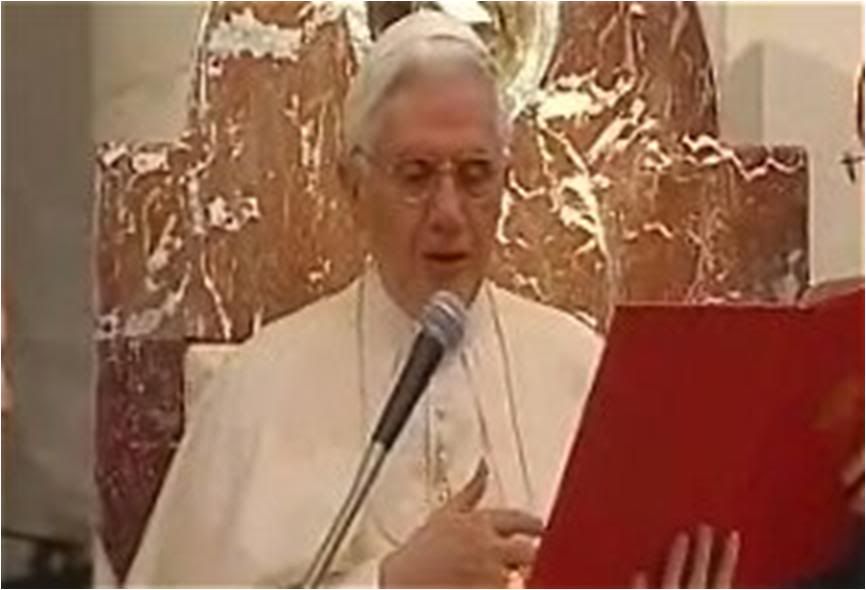
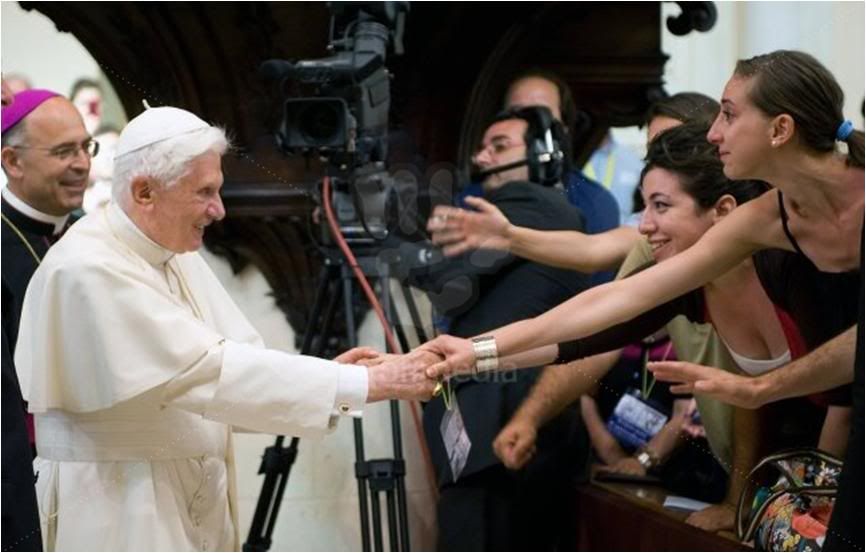
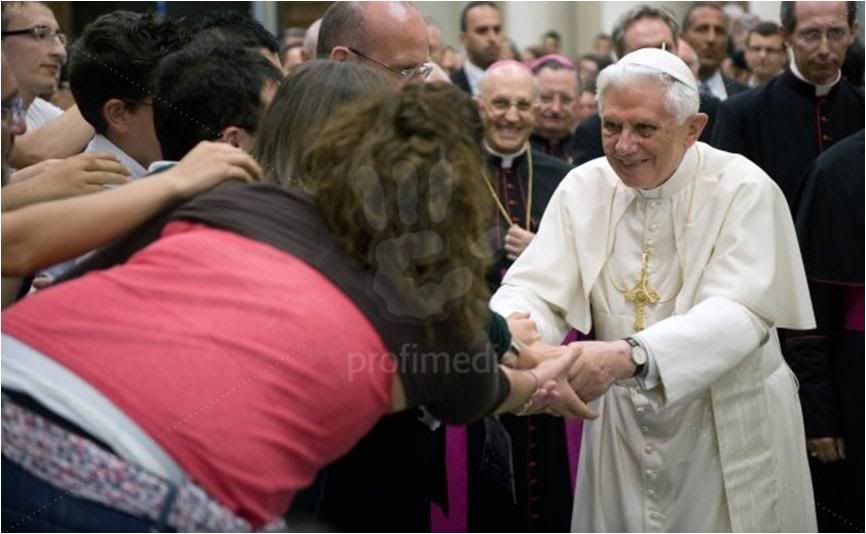
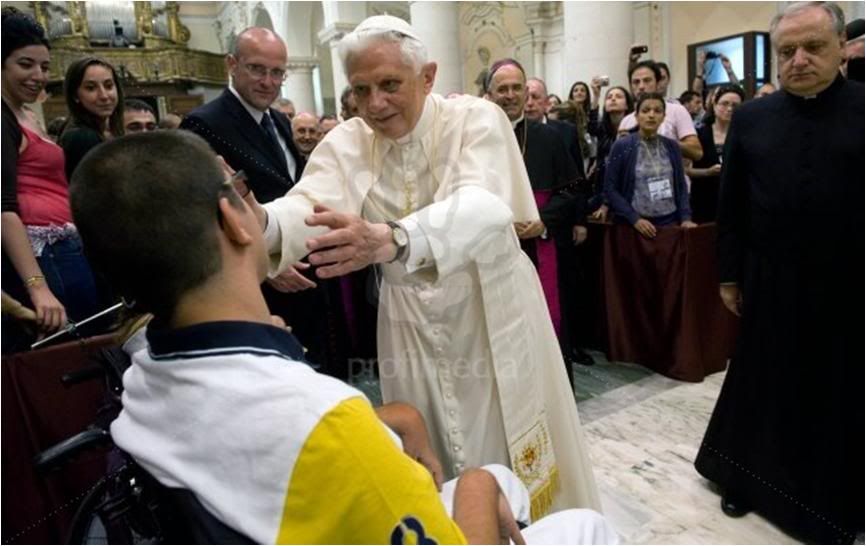
After the encounter with the youth, the cathedral crypt with the tomb of San Panfilo, relics of San Pietro Celestino, and an exhibit of objects associated with the latter.
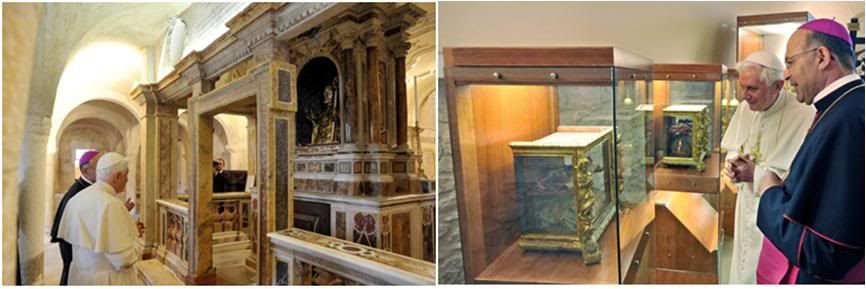
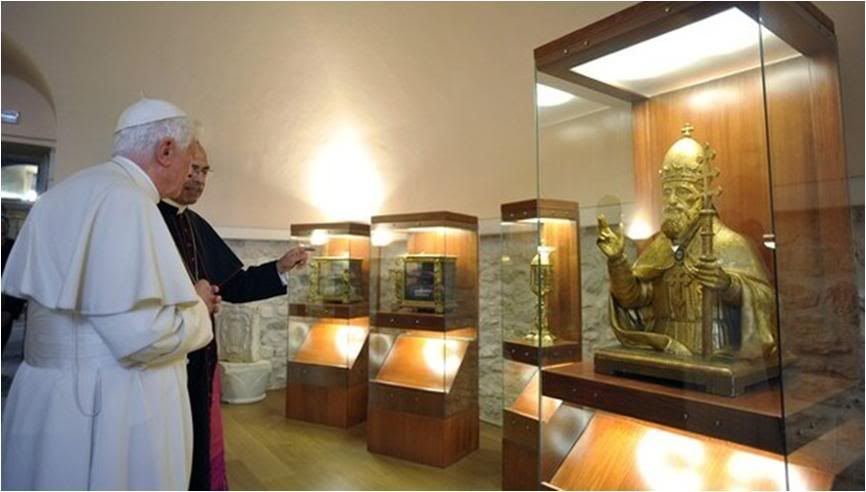
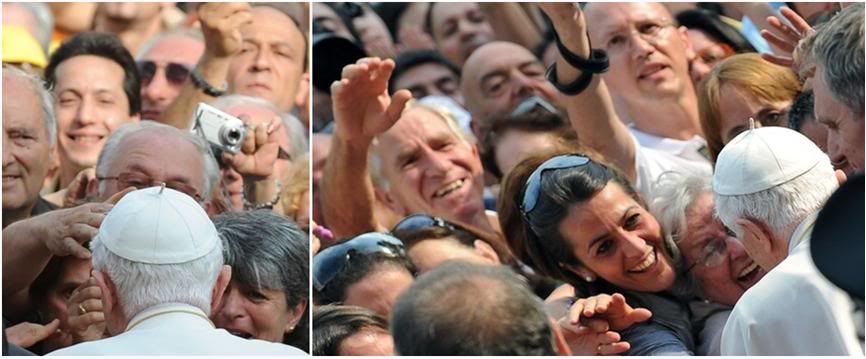 Benedict XVI says priests
Benedict XVI says priests
are a precious presence
'for all our weaknesses'
SULMONA, Italy, July 4 (AP) - Pope Benedict XVI said Sunday that "for all our weaknesses" priests have an important role in the world.
Benedict did not directly mention the clergy abuse scandal that has rocked the Catholic church for months. But during a daylong visit to a central Italian town, he received a round of applause and words of support by local youths greeting him "in this time of harsh attacks and media provocation."
Minutes later, Benedict told the youths that "for all our weaknesses, priests are still a precious presence in life."
The trip to Sulmona was dedicated to honoring Celestine V, the 13th-century hermit who resigned the papacy saying that he was not up to the task.
Benedict said his simple and humble lifestyle can serve as an example for modern men and women. The pontiff praised his predecessor for his detachment from material things such as money and clothes.
"We, too, who live in an epoch of greater comfort and possibilities, are called upon to appreciate a sober lifestyle," the pope said.
Celestine V resigned just months after becoming pope in 1294 at age 85. He was later put under guard for fear he would become the rallying point for a schism. Celestine died in 1296 and was declared a saint in 1313.
Benedict, at times wiping his forehead, conducted an open-air Mass in hot weather before thousands of faithful in one of Sulmona's main squares.
In modern society, Benedict told them, "it seems that every space, every moment must be filled with initiatives, activities, sounds. Often there isn't even the time to listen."
"Let's not fear the silence inside and outside of us, if we want to be able to perceive not just the voice of God but also (the voices) of those who are next to us," he said.
The pope also sought to encourage those still suffering from the earthquake that struck this region in April 2009, killing some 300 people. Benedict visited the area soon afterward, praying before the salvaged remains of Celestine.
[The glass casket containing the saint's remains actually survived the earthquake intact, despite extensive damage to the Basilica housing it.]
The Pope's meetings with
prisoners and with the youth
Adapted and translated from

July 5, 2010
SULMONA - The meeting between the Holy Father and a delegation from Sulmona's 'super-jail' took place in strict privacy at the Casa Sacerdotale yesterday afternoon.
But Fr. Ciro Benedettini, deputy director of the Vatican Press Office, provided some information. The delegation included the prison warden Sergio Romica, the chaplain Fr. Franco Messori, some representatives of the jail's custodial force, and five persons representing the inmates.
"I am very happy to be with you, although I would have wanted to be with all of you. I wish that you can all find your way and eventually contribute to society according to your abilities and the gifts that God has given you", the Pope told the inmates. "I will carry you in my heart".
The inmate representatives were chosen from those who are entitled to limited privileges of leaving the prison under Article 21 of italy's Penal Code.
After this meeting, the Holy Father proceeded to the Cathedral of San Panfilo where he met with the 'real strength' of the city - its youth.
More than 500 of them crowded the medieval church along with many priests. They spent the afternoon in prayer and song, waiting for the Pope.
[The report then mentions the highlights of the Pope's address to the young people.]
The young people applauded thE Pope often and enthusiastically, with chants of 'BE-NE-DET-TO'.
Their two spokesmen, Francesca Orsatti and Cristian Di Sansa, spoke about the crisis in a region that is suffering the consequences of a devastating earthquake last year, aggravating problems like unemployment, and the natural difficulties of young people undergoing transition towards maturity.
They also expressed their support for the Pope at a time when the Church is undergoing heavy criticism, saying: "We the youth of Sulmona are not afraid to shout to the world: Holy Father, we are with you!"
Thanks to Gloria for these pictures of the Pope's meeting with the prison delegation from her Photogallery:
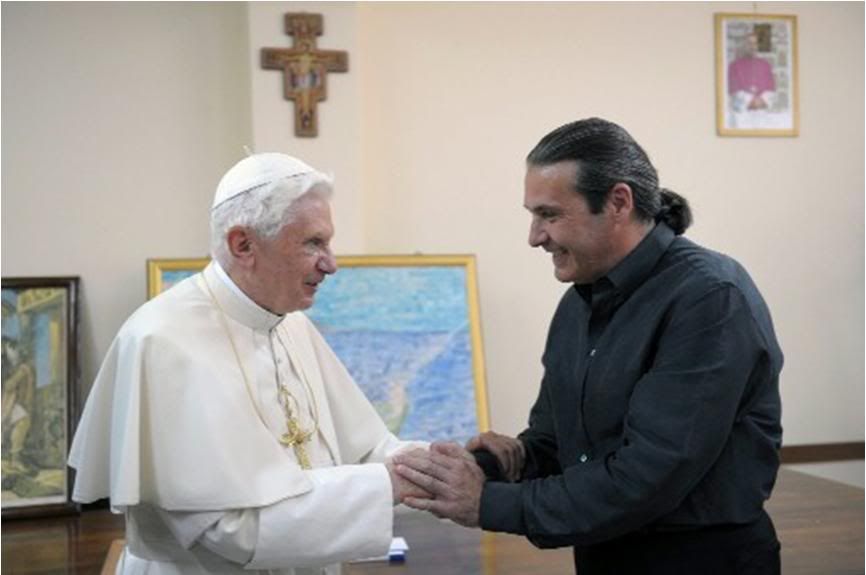
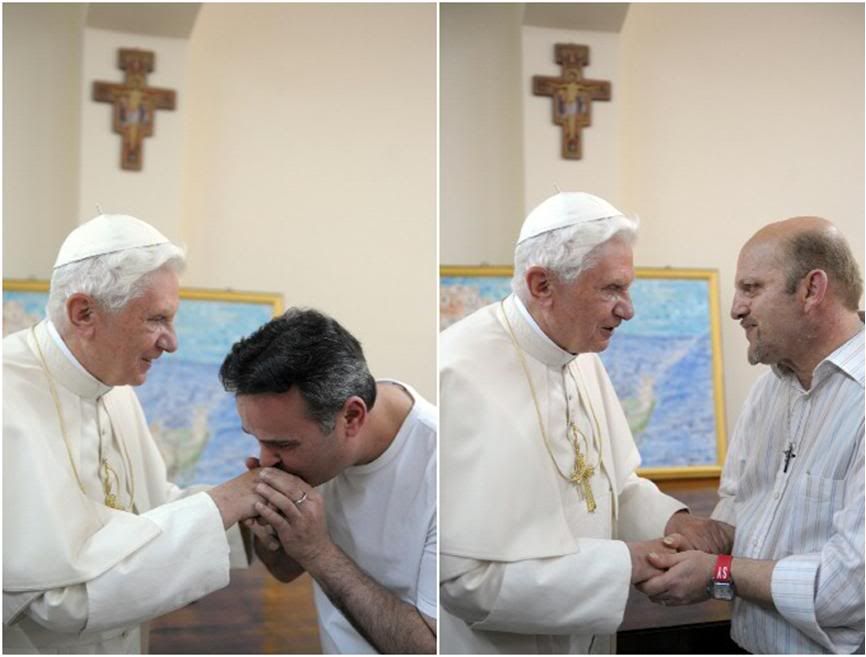 The man in the Roman collar is obviously the chaplain, the man in the left photo above, a prisoner; but I cannot tell if the man on the right photo is another prisoner or the jail warden.
The man in the Roman collar is obviously the chaplain, the man in the left photo above, a prisoner; but I cannot tell if the man on the right photo is another prisoner or the jail warden.
[Modificato da TERESA BENEDETTA 05/07/2010 15:52]